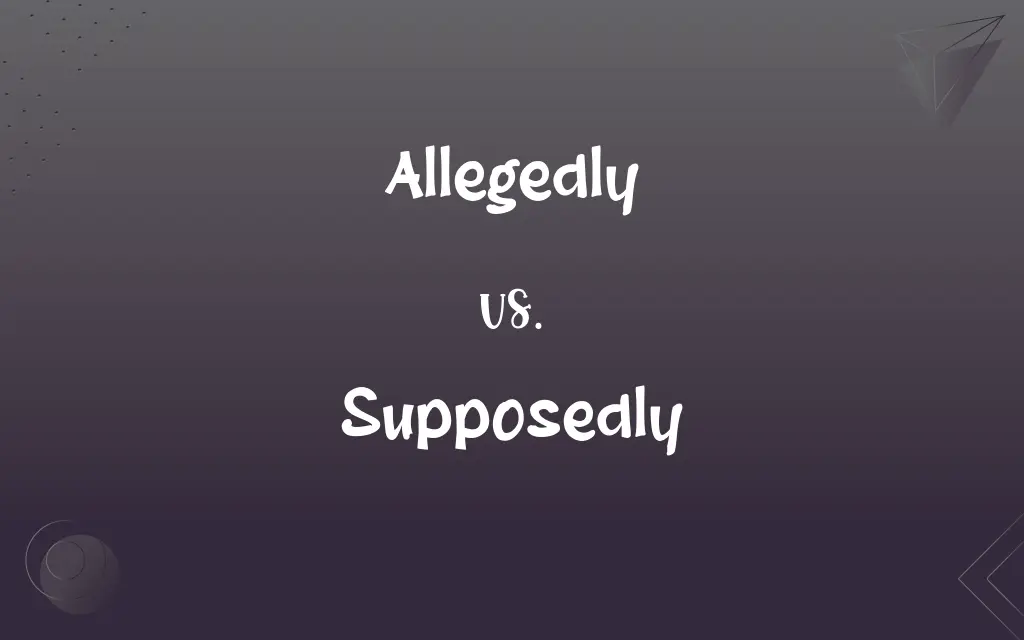Allegedly vs. Supposedly: What's the Difference?
Edited by Aimie Carlson || By Harlon Moss || Published on January 29, 2024
Allegedly implies something is claimed to be true without proof, often in legal contexts. Supposedly suggests something is believed or reputed to be the case, but not confirmed.

Key Differences
Allegedly is used when referring to something that is claimed but not proven, often in a legal or formal context. Supposedly indicates a common belief or assumption, without strong evidence or confirmation.
The term allegedly often carries a legal connotation, suggesting an accusation or claim without yet having evidence. Supposedly is used more in casual or informal contexts, indicating hearsay or unverified information.
Allegedly is frequently employed in news reporting or legal discussions to indicate unproven allegations. In contrast, supposedly is used to express doubt or skepticism about the validity of a claim.
When using allegedly, there's usually an underlying implication of a formal accusation or charge. Supposedly leans towards conveying rumors, speculations, or unconfirmed reports.
In communication, allegedly serves as a safeguard against making definitive statements about unproven facts, while supposedly suggests the speaker's uncertainty or skepticism about the information.
ADVERTISEMENT
Comparison Chart
Connotation
Legal, formal
Informal, speculative
Context of Use
Legal accusations, news reporting
Casual conversation, expressing doubt
Implication
Claim without proof
Belief or assumption without confirmation
Tone
Neutral, cautious
Skeptical, uncertain
Purpose
To indicate unproven allegations
To express rumors or unverified information
ADVERTISEMENT
Allegedly and Supposedly Definitions
Allegedly
Claimed to be the case, without proof.
He was allegedly involved in the robbery.
Supposedly
Used to express hearsay or rumor.
She is supposedly moving abroad.
Allegedly
Stating something based on claims or allegations.
The technology was allegedly stolen.
Supposedly
Believed or reputed to be the case.
He is supposedly the best in the field.
Allegedly
Referring to accusations not yet legally proven.
She was allegedly seen at the crime scene.
Supposedly
Indicating doubt or skepticism about a claim.
He is supposedly a millionaire.
Allegedly
Indicating something that is supposed but not proven.
The company allegedly violated regulations.
Supposedly
Commonly thought or believed.
The ghost town is supposedly haunted.
Allegedly
Used to convey reported claims, not necessarily true.
The artist allegedly plagiarized the song.
Supposedly
Suggesting something without confirmation.
The event is supposedly happening next week.
Allegedly
Represented as existing or as being as described but not so proved; supposed
An alleged conspiracy.
An alleged traitor.
An alleged victim of a crime.
Supposedly
(also sə-pōzĭd) Presumed to be true or real without conclusive evidence
A supposed spy.
The supposed decline of culture.
Allegedly
According to someone's allegation.
The suspect was allegedly involved in the robbery, but his alibi placed him in another state at the time.
Supposedly
(also sə-pōst) Intended
Medication that is supposed to relieve pain.
Allegedly
According to someone's conspicuous impressions (which could subsequently be alleged).
The game is allegedly exciting.
Supposedly
Required
He is supposed to go to the store.
Allegedly
According to what has been alleged;
He was on trial for allegedly murdering his wife
Supposedly
Permitted
We are not supposed to smoke here.
Supposedly
Firmly believed; expected
You're supposed to be my friend.
Supposedly
As a matter of supposition; in the beliefs or according to the claims of some people.
People from other planets have supposedly visited Earth in flying saucers.
According to your testimony, you were supposedly at home watching TV when the murder occurred.
Supposedly
Believed or reputed to be the case
FAQs
Can allegedly imply guilt?
Allegedly implies a claim or accusation, not necessarily guilt.
What does allegedly mean?
Allegedly means something is claimed to be true but not yet proven.
Is allegedly neutral in tone?
Yes, allegedly is usually neutral, indicating unproven claims.
Is allegedly used in legal contexts?
Yes, allegedly is often used in legal contexts to refer to unproven accusations.
Does supposedly indicate certainty?
No, supposedly does not indicate certainty; it suggests unconfirmed belief.
Does allegedly confirm the truth?
No, allegedly does not confirm the truth; it indicates something unverified.
Is supposedly formal or informal?
Supposedly is more informal and often indicates speculation or rumor.
Is supposedly used for rumors?
Yes, supposedly is often used when referring to rumors or unconfirmed reports.
Can supposedly be used in news reporting?
Supposedly can be used in news, but it implies unconfirmed or speculative information.
Is allegedly more formal than supposedly?
Yes, allegedly is generally more formal and used in serious or legal contexts.
What does supposedly mean?
Supposedly means something is believed or assumed to be true, but not confirmed.
Can supposedly express doubt?
Yes, supposedly can express doubt or skepticism about information.
Can allegedly be used casually?
Allegedly is less casual, often used in formal or serious contexts.
Can allegedly be proven later?
Yes, allegations stated as allegedly can be proven or disproven later.
Does allegedly always involve legal matters?
Not always, but allegedly is commonly associated with legal or formal allegations.
Can supposedly indicate uncertainty?
Yes, supposedly often indicates the speaker's uncertainty about the information.
Is allegedly a way to avoid libel?
Yes, allegedly can be used to avoid making definitive statements that could be libelous.
Does supposedly imply personal belief?
Supposedly often reflects the speaker's belief or what is commonly thought.
Is supposedly less cautious than allegedly?
Supposedly is less about caution and more about speculation or common belief.
Does allegedly protect against legal repercussions?
Using allegedly can provide some protection against legal repercussions in claims.
About Author
Written by
Harlon MossHarlon is a seasoned quality moderator and accomplished content writer for Difference Wiki. An alumnus of the prestigious University of California, he earned his degree in Computer Science. Leveraging his academic background, Harlon brings a meticulous and informed perspective to his work, ensuring content accuracy and excellence.
Edited by
Aimie CarlsonAimie Carlson, holding a master's degree in English literature, is a fervent English language enthusiast. She lends her writing talents to Difference Wiki, a prominent website that specializes in comparisons, offering readers insightful analyses that both captivate and inform.







































































